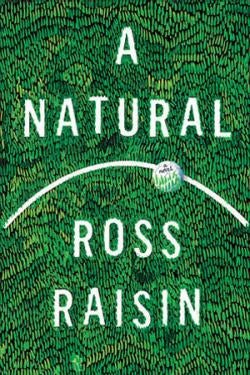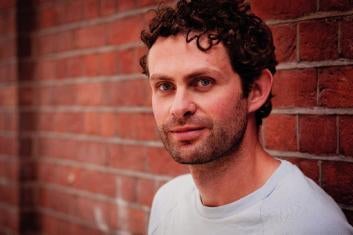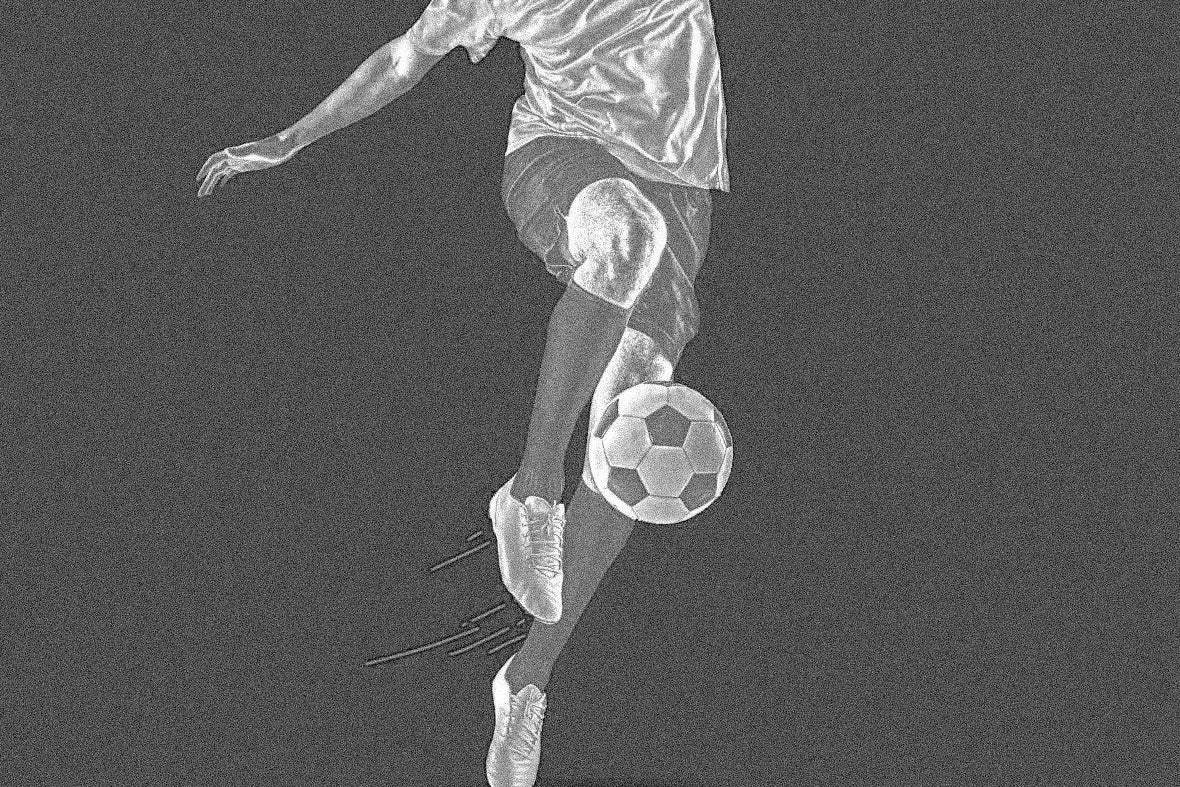A Natural, the third novel from Ross Raisin—one of Granta’s Best of Young British Novelists, and something of a natural himself—is un-self-consciously concerned with themes that could give certain readers pause. Masculinity, loneliness, desire, and the fragility of the body are weighty preoccupations under any circumstances, and when they are worked out through an anthropology of the world of English football (i.e. soccer), they can feel pitched at a niche audience—one of serious-minded young men, perhaps. But Raisin’s meditative, quietly lyrical window onto a specific culture did not alienate this particular outsider. Instead, it played much like any other novel that investigates a subgroup in order to throw light on dynamics that affect us all.
When the book opens, 19-year-old Tom Pearman has just lost his contract at a Premier League academy and signed with Town, a lower-level club. He is talented, but the scope of his gifts and the tier of play on which he really belongs is never quite clear to him or to us. As a result, Tom spends the novel in an almost ontologically precarious position, balanced between the dream of stardom and the terrifying prospect of slipping even further down the ladder. His new team is captained by Chris Easter, a golden bully whose casual toxicity sets the tone for the rest of the players. (In one harrowing hazing ritual, the squad pins down a junior player, strips him, and paints his genitals with boot polish. The young man quits a few weeks later.) Amid this looming and diffuse threat of sexual humiliation, Tom develops an attraction to Liam, the club groundskeeper. As the pair comes together in a series of angry and borderline-violent encounters, Raisin seems to be flirting with the trope of the tortured closet case. But soon, Tom and Liam are not simply having sex. They are conducting a real and complex, if secret, relationship.
A Natural is a slow burn of a book, the novelistic equivalent of an athlete gradually limbering up. The first part, in which shy, secretive Tom attempts the delicate balance of male bonding and “no homo” with his teammates, is mostly tone painting. But the last third uses strategic strokes of plot—a determinative game, swirling rumors—to apply increasing degrees of pressure to the characters. The results are riveting, full of airlessness and desperation.
Tom, who whiles away much of the season on the bench, is not the only one haunted by different forms of potentiality. Sidelined by a gruesome knee injury, captain Chris must confront the specter of failure and the revolt of his body. (He does so by posting anonymously on an internet forum devoted to his team.) And his wife, Leah, feels frozen in place: Though she tentatively wants to pursue a career in design, she is instead stuck waiting hand and foot on an emotionally distant husband and their demanding toddler.
Raisin proves a restrained yet imagistic writer, well-suited to describing people who observe rather than participate. His prose, combining a flattened emotional affect with chaotic eruptions of visual description, turns repression into an aesthetic. Consider the book’s first sentence: “A few drivers had slowed to look up at the side of the coach as it circled the roundabout.” Now consider the second: “Three pairs of white buttocks were pressed to the glass like a row of supermarket chicken breasts.” But language is just one arena in which A Natural enacts a contest between discipline and permission. On a narrative level, the novel emphasizes how rigorously Tom and his teammates need to control their bodies via endless drills and dietary restrictions. The everyday physical concerns of a professional footballer, which include a near-carnal obsession with other players’ fat and musculature, is recapitulated in excruciating detail. (I lost count of the number of times characters reflect on each other’s minutely fluctuating “shape” and “fitness.”) The threat of injury hovers over the locker room, evocative of weakness and disorder, the subjugated soma suddenly returning fire. Sprains and fractures spook the team’s manager so thoroughly that he forces hurt players to sit, stretch, and eat apart from the rest of the group, like lepers. “He thinks we’re going to contaminate them or something,” complains one of Tom’s friends in the treatment bay.

All of this self-mastery, we’re to understand, might pay off in athletic excellence. But that same narrative of appetite regulation redounding to one’s benefit doesn’t quite map onto sexual desire. Suppressing your sexual orientation is certainly grueling and painful—but is it at all valuable? While Tom’s ability to deny his longings (or conceal them) does earn him the privilege to continue playing football, Raisin subjects that calculus to intense scrutiny, if not outright critique. For one thing, being around bigots stinks. “In the miserable sweaty fug of the dressing room,” he writes, describing the desolate aftermath of a loss, “the manager told them that they were a bunch of soft fucking fairies. When one of the younger players giggled, the manager stepped forward and kicked him in the leg.”
Yet A Natural does not expend too much energy on cartoon villains. Instead, the book feels admirably sensitive to how the world around its characters’ insular sports community is changing. Even as some stakeholders and fans spew medieval hate, many more profess to tolerate and support LGBTQ people. Faced with the bogey of a gay teammate, not every man on Town is a seething homophobic Chris. When gossip about Liam and an unnamed Town athlete reaches the local papers, the club secretary suggests “flying a discreet rainbow flag somewhere within the stadium … probably on top of the disabled supporters’ stall.” The managers issue a statement that says, “We have a policy of tolerance and openness at this club. It does not matter the sexual orientation, color, or any other issue to do with our staff, whether that be a club employee or a player. … We are pleased and proud, however, to say that such a situation has never arisen here.” Such double-talk adds contemporaneity and shading to a literature of gayness previously defined by blunter opposition. (Think Brokeback Mountain.) In addition to skewering obvious jerks, Raisin captures a nuanced moment in the evolution of “progressive” thinking: that tremulous, infuriating juncture at which ambivalent people outwardly insist on their allyship.

But perhaps the book’s most poignant episodes emerge from its willingness to imagine an alternative to how things are. What would it look like, Raisin asks, if the whole system of repression and regulation were overturned? Liam lovingly tends to the football field during the season, but during the offseason, Raisin graces us with a vision of the green when no one is cutting the grass:
The pitch—scarified, sanded, photo-documented, cored by two million miniature drainage channels, fertilized, scrupulously watered—had been growing half an inch a night since the overseeding program. Almost a month on, it resembled a meadow. The wind gusting between the stands caused glossy waves to course down its length. Butterflies were drawn to one section, where a cluster of wildflowers had migrated from the banks of the river. According to Liam, adamant despite Tom’s skepticism, there was a visiting deer.
This is pure pastoral, a melody from England’s past—Spenser, Marlowe—carried wayward like those wildflowers by some improbable draft. It is a passage suffused with freedom and beauty. And it evokes the not-entirely-platonic grief of the poet John Milton for his friend Edward King, drowned at sea and memorialized in the elegy “Lycidas”: “For we were nurs’d upon the self-same hill/ Fed the same flock, by fountain, shade, and rill;/ Together both, ere the high lawns appear’d/ Under the opening eyelids of the morn.”
There is a bright and tender interlude in A Natural during which Tom and Liam go on holiday together in Portugal. For the first and only time, they can express spontaneous affection. “Surrounded by the melee of the departures hall,” Raisin writes, “Tom took hold of both Liam’s hands and, in full view of all the gawping children and silently disgusted fathers, kissed him.” That lightness disappears when the two men return to England. At a pub with his baby sister Rachel, Tom “marvel[s] at how at ease she was with everybody … how unlike him she was.”
The line feels like a throwaway, but it strikes at the heart of the book’s title and all-consuming theme. What does it mean to act, to be, “natural”? In the context of the football pitch, it means to play easily and fluidly, a state Tom can only reach a few times over the course of the book. In life, is it to live within the constraints of heterosexuality, custom, and regimen, or is it to be yourself? Put another way: Which accords more with the rightful order of things—the waving meadow or the close-cropped green?
The morning after Tom and Liam sleep together on the club’s overgrown pasture, Liam arrives to cut it down. “Behind the whining black mower Liam advanced steadily, exactly, his gaze locked ahead. A fountain of chopped grass sprayed from the rotary blade,” Raisin reports. The scything of the pitch conjures any number of associations: castration, exposure, even the “blind Fury with th’abhorred shears” who “slits the thin-spun life” of Milton’s friend. A Natural owes something to elegies as well as to sports-tinged coming-of-age novels like A Separate Peace and The Art of Fielding. What it adds to these genres, though, is narration attuned to the kind of coded and private language that LGBTQ people have relied upon for years to seek each other out. In tightly controlled spaces, everything becomes eroticized. A blade of grass acquires sensuality and luster. The body is inescapable. Toward the end of the book, Liam touches the “thick pelt of sward, anticipating every dip and curve, every change in moisture.” “There were scars everywhere,” Raisin explains, before deferring to the fertile fact of the groundsman’s interiority, “known only to him.”
—
A Natural by Ross Raisin. Random House.
Read the rest of the pieces in the Slate Book Review
